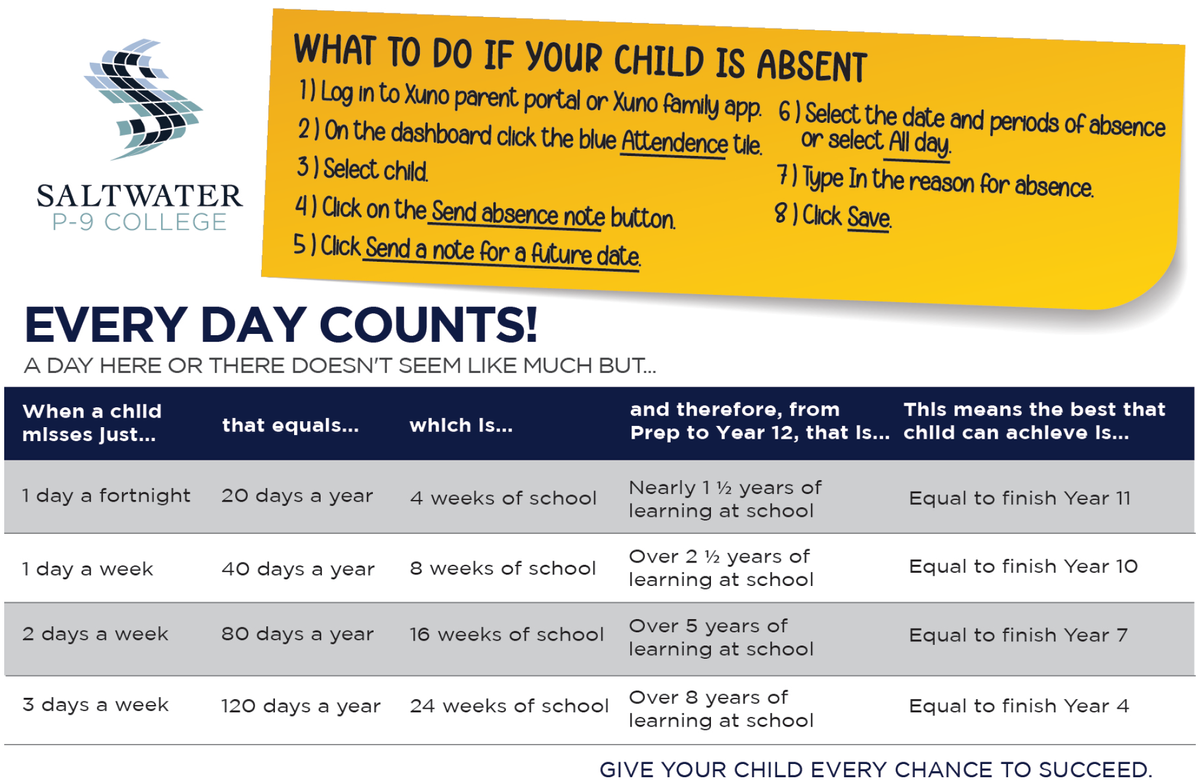Attendance & Engagement

EVERY DAY COUNTS
Going to school every day is the single most important part of your child’s education. Students learn new things at school every day – missing school puts them behind.
Why it’s important
We all want our students to get a great education, and the building blocks for a great education begin with students coming to school each and every day. If students miss school regularly, they miss out on learning the fundamental skills that will set them up for success in the later years of school. There is no safe number of days for missing school – each day a student misses puts them behind, and can affect their educational outcomes. Each missed day is associated with progressively lower achievement in numeracy, writing and reading.
Getting in early
Attendance patterns are established early – a child regularly missing days in kindergarten or in the early years of school will often continue to miss classes in the later years, and receive lower test scores than their classmates. It’s vital that students go to school every day – even in the early years of primary school.
Missing one day of school in Years 7 to 11 can slightly lower a student’s grades. If a student misses 13 days in total, their grades could drop by one full level.
· Every extra day a student misses between Years 7 and 11 could result in earning about $15,430 less over their lifetime (adjusted for today’s money).
· Students who regularly miss school (more than 10% of the time) could lose about $13,372 in future earnings for each extra day they are absent.
· If a student misses just one extra day in Year 10 or 11, their earnings at age 28 may be about 0.8% lower than they would have been.
· Students who frequently miss school are 2.7 times more likely to need government benefits as adults. Those who miss more than half of their school days are 4.2 times more likely to need benefits.
· Students who regularly miss school are 60% less likely to have a stable job for at least a year.
For those who miss over half their school days, this drops even further to 75% less likely.
What we can do
The main reasons for absence are:
Sickness – There are always times when students need to miss school, such as when they’re ill. It’s vital that they’re only away on the days they are genuinely sick, and setting good sleep patterns, eating well and exercising regularly can make a big difference. It's vital that holidays are planned during school holidays where possible, and not during the term if it can be avoided.
“Day off” – Think twice before letting your child have a “day off” as they could fall behind their classmates – every day counts.
Truancy – This is when students choose not to go to school without their parent’s permission. There can be many reasons for truancy. The best way to address this is for schools and parents to work together.
If for any reason your child must miss school, there are things you can do with your school to ensure they don’t fall behind:
• Speak with your classroom teacher and find out what work your child needs to do to keep up.
• Develop an absence learning plan with your teacher and ensure your child completes the plan. Remember, every day counts.
If your child must miss school, speak with your classroom teacher as early as possible.
Openly communicating with your child's school about all absences is a good way to prevent attendance issues being escalated to a School Attendance Officer. A School Attendance Officer is a Department of Education and Early Childhood Development Regional Director who has authority to follow up attendance issues. Attendance issues that are escalated can lead to an Infringement Notice.
If you’re having attendance issues with your child, please let your classroom teacher know so we can work together to get your child to school every day. For more information and resources to help address attendance issues, visit: www.education.vic.gov.au/school/parents/ behaviour/Pages/studentattendance.aspx
Thank you,
Brent Syme
Assistant Principal



